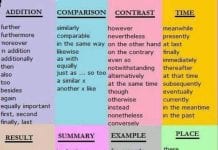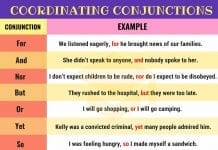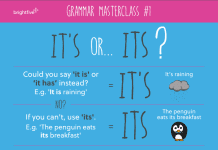In English, you may often talk and write about plural nouns. Any time you refer to more than one thing, you should use the plural form of the noun instead of the singular.
While many nouns are made plural the same way, there a several rules and a multitude of exceptions! Some of these are explained below.
Skype English Lesson with a native AMERICAN or BRITISH teacher ››
Regular nouns
Regular nouns are the most common. For these, you can simply add an s at the end of the noun to change it from singular to plural.
Examples
- Book becomes books
- Movie becomes movies
- Handle becomes handles
- Airport becomes airports
Words that end in s, x, z, ch, and sh
Add an es for these nouns to make them plural.
Examples
- Box becomes boxes
- Buzz becomes buzzes
- Gas becomes gases
- Bench becomes benches
- Stash becomes stashes
Skype English Lesson with a native AMERICAN or BRITISH teacher ››
Words that end in -F or -FE
For most of these nouns, remove the –f or –fe ending of the singular noun. In place of those letters, add –ves to make the nouns plural.
Examples
- Hoof becomes hooves
- Wolf becomes wolves
- Safe becomes saves
- Knife becomes knives
Like many rules, this one has several exceptions. There is no general rule for knowing which words are exceptions.
However, any words that end with double fs (-ff) or have double fs before a final letter e (-ffe) always keep the fs in the plural form. Other exceptions should be memorized.
Examples
- Staff becomes staffs
- Roof becomes roofs
- Cliff becomes cliffs
- Giraffe becomes giraffes
Words that end in A vowel and a final Y
Because there are already vowels at the end of these words, they do not need another vowel to help it become plural. Instead, simply add an s at the end to make it plural.
As you will see with the other rules and examples, there seems to be a limit on the number of vowels that a plural noun can have at the end of the word.
Examples
- Clay becomes clays
- Monday becomes Mondays
- Key becomes keys
- Prey becomes preys
- Boy becomes boys
There are some exceptions to the rule. These include the following:
- Money becomes monies
Skype English Lesson with a native AMERICAN or BRITISH teacher ››
Words that end in a consonant and a final Y
These words are different from the ones with vowels in that the y at the end of these words is changed into an ies to make the word plural from its singular form.
Examples
- Quality becomes qualities
- Specialty becomes specialties
- Delivery becomes deliveries
- Fantasy becomes fantasies
Words that end in a vowel and a final O
Like the words that end in a vowel and a final y, these words become plural just by adding an extra s. This includes the letter y, which can be considered a vowel in some situations. It also keeps the number of vowels from exploding.
Examples
- Video becomes videos
- Embryo becomes embryos
- Audio becomes audios
- Cameo becomes cameos
Skype English Lesson with a native AMERICAN or BRITISH teacher ››
Words that end in a consonant and a final O
Like the words that end in a consonant and a final y, most of these words end with an added es at the end of its plural forms. This applies to the majority of these words.
Examples
- Buffalo becomes buffaloes
- Placebo becomes placeboes
- Vertigo becomes vertigoes
- Memento becomes mementoes
- Wendigo becomes wendigoes
However, there are several exceptions to this rule. Most of these words seem to have double consonants before the last o vowel, but not all words that have double consonants before the last o will be spelled with just s at the end for plural forms.
- Cello becomes cellos
- Memento becomes mementos (there are two spellings for this word)
- Machismo becomes machismos
- Photo becomes photos
Plural words that result from irregular changes
Not all plurals have regular rules that govern their change from singular form to plural form. Many of these words sometimes have the same pattern, but many of them don’t.
For these words, memorizing them or relying on an outside resource (a person, dictionary, website, etc.) can be the best way to check whether you have the right spelling or not.
The words with double O’s in the middle
Some, but not all, words with double o’s in the middle of the word are made plural by changing those o’s into e’s. This generalization does not include words like bamboo, which has the double vowels at the end of the word and is made plural as bamboos.
Examples
- Tooth becomes teeth
- Goose becomes geese
- Foot becomes feet
However, there are many of these nouns that follow the regular plural noun rules.
Examples
- Food becomes foods
- Hood becomes hoods
- Loop becomes loops
Skype English Lesson with a native AMERICAN or BRITISH teacher ››
Words that end in US
Words that end in us are complicated, because they follow all sorts of rules. Some of them follow the regular noun rules (walrus becomes walruses, though walrus with no change is also correct).
Others of them follow the rule that the us letters at the end are replaced by an I instead. Many of these words have several correct plural forms, which makes it easier to ensure you write them correctly but can be confusing when you are trying to learn them.
The different correct forms of the plural words do not differ.
Examples
- Octopus becomes octopi or octopuses
- Cactus becomes cacti or cactuses
- Hippopotamus becomes hippopotami or hippopotamuses
- Fungus becomes fungi or funguses
- Focus becomes foci or focuses
- Terminus becomes termini or terminuses
Some words cannot have the I ending in the plural form. They only follow the regular plural noun rules.
- Circus becomes circuses
- Bonus becomes bonuses
- Thesaurus becomes thesauruses
- Genius becomes geniuses
Note that it is difficult to know which noun is which type of plural, but words with vowels before the us ending cannot become plurals that end in i.
The invariants
The last group of plural nouns are those that do not change at all between the singular and plural forms. These words could be singular or plural – only the context of the word could give you that indication. Many but not all of these examples are animals.
These examples seem to be more common than you may first realize:
- One deer = two deer
- One sheep = three sheep
- One moose = a hundred moose
- One bass = five bass
- One species = a thousand species
- One Celsius = two million Celsius
- One yen = ten billion yen
- One rendezvous = two rendezvous
There are some invariants that are not true invariants. In other words, some words in the singular form can have both the singular and plural meaning, but there can also be a separate plural form of the word.
Examples
- Yeti can be singular and plural, or be two yetis
- Fish can be singular and plural, or be five hundred fishes
Even though there are many different types of plural nouns that you can study, most spell check programs (including the ones built into word processors like Microsoft Word can catch if you make a mistake!
Also remember that, most of the time, nouns follow the standard rules. There are far fewer exceptions than normal nouns.
Plural Nouns Quiz
Part 1. – Put the noun in the correct plural form
1) Can you please bring me those (plate) ___________ from the kitchen.
2) Wild (goose) ___________ fly south for the winter.
3) Those (kid) ___________ were out there playing football all day.
4) I don’t like (cat) ___________, I prefer (dog) ___________ more.
5) She said she saw lots of (mouse) ___________ in the basement.
6) (Leaf) __________ start falling in September.
7) Thank you for the (information) ____________.
8) What are you going to do with all that (money) __________.
9) Did Jacob bring the (puck) ___________ and (stick) __________ from the dressing room?
10) In this neighborhood they built a lot of new (house) ___________.
11) My grandma would always sit in the park and watch the (child) _________ play.
12) Do you have any (brother) ___________ and (sister) ___________?
13) In geography we learned that Scotland has a lot of (sheep) _____________.
14) Alison broke both her (foot) ____________ in a skiing accident.
15) Don’t forget to brush your (tooth) ___________.
Answers:
- Plates
- Geese (irregular plural form)
- Kids
- Cats / Dogs
- Mice (irregular plural form)
- Leaves (irregular plural form)
- Information (uncountable and has no plural form)
- Money (uncountable and has no plural form)
- Pucks / Sticks
- Houses
- Children (irregular plural form)
- Brothers / Sisters
- Sheep (irregular plural form)
- Feet (irregular plural form)
- Teeth (irregular plural form)
Part 2. – put the nouns and verbs in the correct plural forms
1) Many (company / is) ___________ ___________ trying to rebuild their facilities after the flood.
2) My (parent / was) ___________ ___________ on vacation last week.
3) We have so many (cat) ___________ outside and they always (eat) ___________ our leftovers.
4) (Boy) ___________ often (not know) ___________ any better.
5) The worker (union / is talking) ___________ ____________ with the senators right now.
6) My (cousin / was) ____________ _____________ playing football in that field just an hour ago.
7) They (is) ____________ keeping them in (chain) __________.
8) Without (go) ____________ into too many (detail) __________, I have to say it wasn’t very goo.
9) I love my (dog) ___________, but they sometimes (is) ____________ a pain in my side.
10) Look at all the (cloud / float) __________ ____________ in the sky.
11) What (is)_____________ you planning on doing with that (information) ____________.
12) The (police / is) ____________ _____________ doing the best they can.
13) There (is) ___________ so many colorful (plant) _____________ in the garden.
14) We never (has / tuna) ___________ ___________ for lunch any more.
15) She loves (use) ____________ hard (brush) ____________ for he paintings.
Answers:
- Companies / Are
- Parents / Were
- Cats / Eat
- Boys / Don’t know
- Unions / Are talking
- Cousins / Were
- Are / Chains
- Going / Details
- Dogs / Are
- Clouds / Floating
- Are / Information
- Police / Are
- Are / Plants
- Have / Tuna
- Using / Brushes
Skype English Lesson with a native AMERICAN or BRITISH teacher ››

























